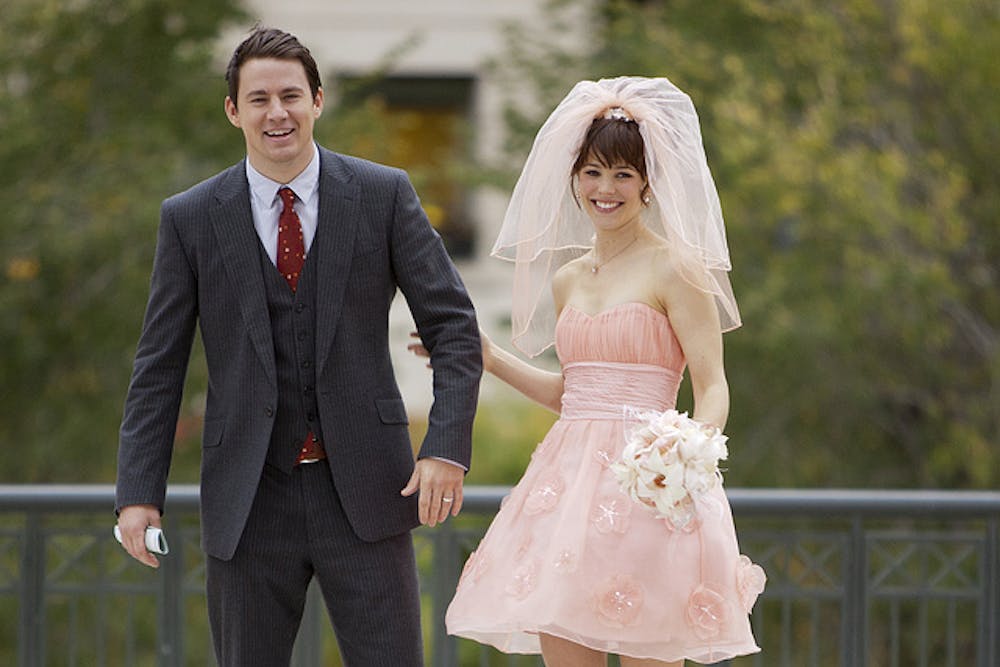Did you hear Rachel McAdams is coming out with a new movie? Don’t roll your eyes. Yes, she’s typecast again as the “other-half” who loves so much it hurts in “About Time,” as well as in “The Vow,” “The Time Traveler’s Wife,” and “The Notebook.” At least we’ll always have “Mean Girls,” which I argue is her pièce de résistance.
I loved the “Notebook,” but every time I see one of these movies forcing extreme romance down our throats, I cringe a little inside. Why does McAdams keep getting typecast into these roles? Arguably, it’s a money model that follows an equation “The Notebook” set up. Ryan Gosling was merely replaced by Channing Tatum or Eric Bana. What I think about most though, is romance in movies and how feminine it is.
Entire movies are based on women wondering if a man likes her, waiting for her prince charming, scheming up a plan to get him to fall in love, keeping things casual, getting jealous - falling apart. Women in the movies are hardly ever in the same scene together without talking about men, but is it a problem?
From a personal standpoint, yes, but let’s ask Sweden, a country fervent on gender equality.
Four Swedish movie theatres have started a movement, “A-märkt,” which will begin publicly labeling films that pass a new, feminist rating system known as the “Bechdel test.” In order for a film to pass with an “A,” a movie must include 1) at least two women 2) who talk to each other 3) about anything other than men.
The test’s name came from a comic that American cartoonist, Alison Bechdel, introduced in 1985 called “Dykes to Watch Out For.”
So is it enough of a problem to garner the response of this test? The Center for the Study of Women in Television and Film, based out of Sand Diego State University, reported in a study that women continue to remain underrepresented in film. In 2011, only 33 percent of all characters in the year’s top grossing films were female. While this number increased from 28 percent in 2002, another number has been dwindling – that of female protagonists. Only 11 percent of women from these 100 films in 2011 were considered protagonists. Male representation dominates roles in politics, science, social, business and religion.
Consider film as a persuasive tool. It was used as propaganda in war times, and it shapes fashion trends more effectively, reaching to a greater audience, than haute couture runway shows can ever hope to achieve. In early cinema, women didn’t have many roles except that of a courtesan. She was an object of desire for the male gaze, and the camera was as a phallic symbol.
Because of early cinema’s representation of women, women in film were historically and psychologically linked to men, desirability and exuding sexuality (in all degrees from cute to erotic).
Culturally significant movies to our generation like “Lord of the Rings,” “Pulp Fiction,” “Avatar,” and “The Social Network,” all fail the Bechdel test. We probably don’t think about how feminist a movie is while enjoying it in theatres, but years’ worth of movies that can’t pass the simple Bechdel test would subtly influence the way society thinks about women.
Popular films that passed the Bechdel test include “Bridesmaids,” “Melancholia,” “The Hunger Games,” “Juno,” “Pitch Perfect,” as well as other films listed by the equality-focused initiative, Equalisters.
Not all films that pass the Bechdel test are considered feminist, and some feminist films may not pass the test either, even if they are making a statement, states A-märkt on their website. The test is simply based on the three criteria, but it has gone viral for shocking audiences into awareness, which is something all films should strive to do.
- Claudia Marina
-------------------------------------------------------------------------------------------
Ever been stunned by the lack of gender equality in movies? So have movie theater owners in Sweden.
Last month, four Swedish movie theaters introduced a movie rating system to rate gender equality in films. The system is based on the Bechdel Test, a theory created by American cartoonist Alison Bechdel in 1985.
To pass the Bechdel test and earn an “A” ranking, a movie must feature:
- At least two named female characters.
- Who talk to each other.
- About something besides a man.
Sweden’s government-funded Swedish Film Institute supports the system, as well as various TV stations, according to an article by USA Today.
The rating system is meant to draw attention to movie viewers about the way women are portrayed in popular films. Still, the system has been adopted by only four theaters so far, all of which are independent art-house theaters.
The Bechdel Test itself has been widely debated by scholars and critics since its inception. Opponents say that just because two named female characters talk to each other about something besides a man, it doesn’t mean that the film is particularly feminist.
"The Avengers" and most of the "Harry Potter" series, for example, don’t pass the Bechdel Test. But Natasha Romanoff and Hermione Granger are arguably two of the best female characters to be seen on screen in recent years.
In this way, the Bechdel Test focuses less on content and more on technicalities. However, it’s still an important, if flawed, way to analyze gender representation in movies.
It’s unlikely that the U.S. would introduce a similar ranking system to movie theaters anytime soon, but hopefully Sweden becomes a model to other countries.
- Marissa Labadie






